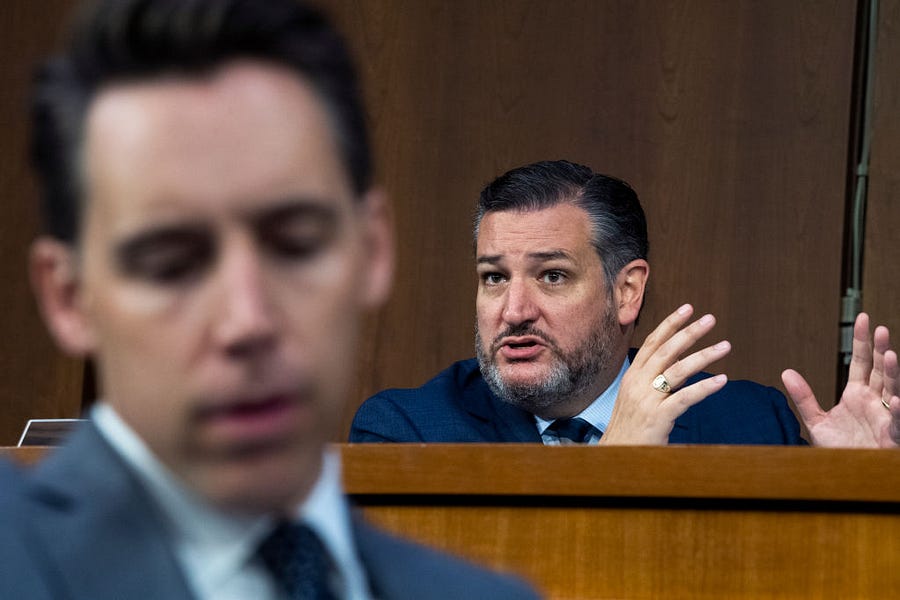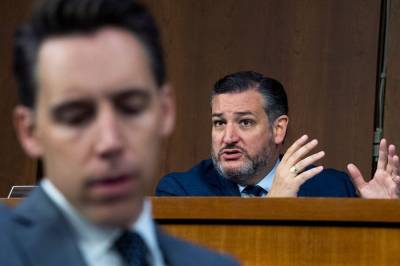For the next few weeks, this newsletter will be dedicated to giving you the first inside look at the 2024 Republican presidential primary. Will they, won’t they, who are they? There’s a lot to cover, so this will be a four-part series, including a rundown of potential candidates, their strengths and weaknesses, short interviews with some of the most well-respected GOP operatives in the field, and of course, some sidebars with me and Chris Stirewalt.
The Contenders
Yes, it’s early. Some of these folks may not run, and undoubtedly many more will throw their hat in the ring at some point. But this is a good start if you want to wrap your head around who is most likely to be spotted eating Casey’s breakfast pizza (think: Iowa) in the next year. We will add to it as need arises. This week, we are tackling …
The Senators
Josh Hawley: The Heir Apparent
41 years old, U.S. senator from Missouri
One of the freshest faces in 2024’s candidate pool belongs to Missouri Sen. Josh Hawley, a freshman whose metamorphosis has been one of the most instructive stories of the Trump era. An Ivy-educated lawyer with a sterling conservative pedigree—he clerked for Chief Justice John Roberts and worked for years for the Becket Fund for Religious Liberty—Hawley launched his political career in 2016 with a successful bid for Missouri attorney general. Two years later, he won the hearts of GOP leadership by winning the long-coveted Senate seat then held by Democrat Claire McCaskill.
As soon as he arrived in D.C., however, Hawley got busy trading in his reputation as a donor-friendly Federalist Society wunderkind for new Trumpian bona fides, setting the bar for slashing populism in the Senate with fierce anti-China rhetoric and legislative crusades against Big Tech. Last year, he became the first senator to pledge to contest the January 6 electoral certification of Joe Biden’s presidential election.
Strategists who have followed his rise speak with one voice about Hawley’s ferocious political ambition; an eventual presidential run is likely less a matter of if than when. So far, Hawley has flatly denied any plans to run in 2024, a posture that makes sense given the strong possibility that Trump himself will try for a Biden rematch. But Hawley’s hard-charging, take-no-prisoners start to his D.C. career has left him with remarkably few allies in the Senate, which means stacking up accomplishments to run on in 8 or 12 years might be a difficult challenge. For Hawley, 2024 may be now or never.
Strengths: Momentum and energy are on his side as the new guy willing to stake out new populist positions in the party (see his take on the minimum wage), maybe the most obvious heir apparent for the diehard Trump voter, and he’s enemy No. 1 on the left, which is definitely a plus on the right.
Weaknesses: The January 6 fist pump may have some GOP voters wondering whether Hawly can win a general, no national organization or experience, no wins to tout—legislative or otherwise—in the Senate, he’ll be running for Senate reelection (but Missouri does not have a “resign-to-run” law).
2024 Tea Leaves: He literally signed a friend’s eighth-grade yearbook: “Josh Hawley, president 2024.” Everyone assumes Hawley is running as “a young man in a hurry,” but he himself has denied it when asked.
Ted Cruz: The Next In Line
50 years old, U.S. senator from Texas
(Disclosure: Sarah worked for Cruz as his political director when he contemplated a run for Texas attorney general in 2009.)
Ted Cruz came in second to Trump in the 2016 primaries, a campaign he recently claimed “was the most fun I’ve ever had in my life.” The junior senator from Texas, Cruz entered Congress in 2013 as part of the Tea Party movement, then quickly earned the ire of the Republican establishment for his go-it-alone tactics to oppose former President Obama’s agenda. In 2013, Cruz led a failed attempt to defund the Affordable Care Act with a government shutdown, giving a 21-hour speech on the Senate floor during which he read excerpts from Green Eggs and Ham by Dr. Seuss.
In 2016, Cruz was the first Republican candidate to announce his campaign for president, giving a speech at Liberty University where he emphasized his role as an outsider and a strict conservative. While Cruz initially rejected calls to criticize Trump, the race eventually descended into a political brawl in which Trump insulted Cruz’s wife and suggested his father had been involved in the Kennedy assassination. In response, Cruz labeled Trump “utterly amoral,” a “pathological liar,” and “a sniveling coward.”
After Trump’s election, Cruz transformed himself into an outspoken advocate of the former president, even going so far as to cast two votes against the certification of the electoral results in Arizona and Pennsylvania after the January 6 insurrection. But Cruz’s path to the Republican nomination likely hinges on the same core of voters who were swayed by Trump in 2016: social conservatives and evangelical Christians.
Strengths: High name ID, has run a national campaign before and has kept most—if not all—of his senior people in place, recently launched the most popular podcast of any politician on either side of the aisle, has an uncanny memory that allows him to recall any line he’s ever delivered and tweak it as if he’s rearranging sticky notes on a posterboard.
Weaknesses: Never clear he learned how to navigate Trump, the first runner-ups sometimes win the nomination but rarely win the general (see, eg, McCain, Romney), that whole Cancun thing didn’t show a lot of crisis management acumen, he’ll also be running for reelection (although Texas’ resign-to-run law doesn’t apply to federal office holders).
2024 Tea Leaves: We don’t need any. Barring a pack of wolves mauling him to death in the mean streets of Des Moines, he’s running.
Tom Cotton: The Policy Wonk
44 years old, U.S. senator from Arkansas
Tom Cotton was elected to the Senate in 2014 as the Tea Party continued to rise in prominence. (Republicans picked up nine Senate seats that cycle, including Iowa’s Joni Ernst and Colorado’s since-defeated Cory Gardner.) Harvard undergrad and Harvard Law may make him sound too similar to Cruz and Hawley, but he’s forged his own path. In 2005, he joined the U.S. Army and was awarded the Bronze Star after serving in Iraq and Afghanistan. After leaving the Army in 2009, he worked at McKinsey & Company, the management consulting firm, and then ran successfully for congress in 2012. He’s married with two kids.
Cotton stands out most for his foreign policy chops—and his impressive ability to stake out popular ground before the rest of the party. He was one of the first to push for a travel ban from China in January 2020 and to raise the possibility that the virus leaked from a lab in Wuhan. Despite widespread criticism and mockery at the time, he was largely vindicated this year as newspapers and media critics came belatedly around to the plausibility of the theory.
He also was out in front of the “law and order” message in response to protests over the summer. In June 2020, Cotton published an op-ed in the New York Times that argued for the deployment of federal troops as an “overwhelming show of force to disperse, detain and ultimately deter lawbreakers.” Internally, the Times faced a revolt from staff for publishing the piece, which resulted in the resignation of the editorial page editor and a five-paragraph editor’s note appended on the online version.
But if Trump has any say, Cotton won’t be the pick. Trump attacked Cotton in January 2021 after Cotton told Trump to accept the results of the presidential election and "quit misleading the American people."
Strengths: Consistent policy and political stands, deep understanding of issues, a favorite among some Trump-skeptical conservatives that may be a viable bridge between some of the current warring GOP factions, targeted by left-wing media (see, e.g., “ranger-gate,” which further endears him to the right.
Weaknesses: Relatively low name ID, no national campaign experience, no obvious fundraising base, lacking charisma/retail politicking skills.
2024 Tea Leaves: In June, Cotton visited Iowa and did 22 pushups on stage with Iowa Sen.Chuck Grassley while Iowa Sen. Joni Ernst counted them off to launch his Veterans to Victory midterm PAC, which will support Republican military veterans running for House and Senate seats in 2022.
Tim Scott: The Guy Everyone Wants on the Debate Stage
55 years old, U.S. senator from South Carolina
Tim Scott was appointed to the post in 2013 by Gov. Nikki Haley after being elected to Congress, the South Carolina House, and the Charleston County Council. When he first ran in 1995, he became the first “African American Republican elected to any office in South Carolina since Reconstruction,” winning nearly 80 percent of the vote with an “overwhelming white vote.”
As the only black Republican senator, Scott quickly became the GOP’s leading voice on race issues. After five Dallas police officers were shot and killed in 2016, Tim Scott revealed he had been stopped seven times in one year after he was elected. “There is absolutely nothing more frustrating, more damaging to your soul,” he said, “than when you know you're following the rules and being treated like you are not.”
Scott is currently trying to get support for a bipartisan criminal justice reform bill that would limit police tactics like chokeholds and no-knock warrants and increase potential civil liability when officers violate a suspect’s civil rights. But while Republicans may want to find a way to support the bill, it is hardly the type of issue that will rally voters to a presidential candidate at a time when Republicans are more interested in talking about rising crime and critical race theory curriculum in schools.
Strengths: A credible GOP voice on race issues, well-liked by his colleagues.
Weaknesses: Low name ID, doesn’t have the “fighter” personality that GOP voters say they want, no serious political operation in place, everyone’s third choice.
2024 Tea Leaves: He gave the widely praised GOP response to Biden’s joint session speech in April and has been headlining 2022 Republican fundraisers in Iowa and New Hampshire.
Operative View: Cruz Has Been Doing the Right Things
I reached out to Jeff Roe, who ran Ted Cruz’s 2016 presidential campaign, to ask “If you were advising a 2024 GOP wannabe right now, what would you be telling them?”
In response, he offered what Cruz has already been doing.
“He has launched the most successful and popular podcast of any politician on either side of the aisle. He has written a best-selling book on the Supreme Court. He has raised more money for House candidates than any other single person aside from McCarthy and Scalise and is top five for giving last cycle to Senate candidates. He will raise more money from more donors than anyone IN CYCLE in 2021. And will reinvest in his operations to create efficiencies and increase ROI. All while keeping his core team intact and adding smart comms people to his orbit in preparation for a run.”
Don’t be fooled by some of the jargon here: This is a seriously impressive list of things Cruz's team has been working on. For example, raising money for other candidates is a three-fer at least. First, you make new friends with the candidates you are supporting, which means endorsements and connections to their state-based teams if the need should arise. Second, you have an excuse to bulk up your list of online donors and build more substantive relationships with larger, regional donors across the country. Third, it allows you to keep your finance team on payroll and gives them time working together to see which messages are resonating. This is a team sport, and ensuring your team has time to gel matters.
Stirewalt’s View: Biden, Not Trump, Is the One to Watch
It’s understandable why so much of the discussion around the Republicans’ 2024 primary field revolves around Donald Trump. Will he run? Who would he back if he doesn’t? Which of the Trump impersonators has the best chance to maintain the former president’s quasi-religious hold on his core supporters? Could conservative and moderate Republicans unite behind a candidate to head the nationalists off at the pass? And on and on and on.
But Trump is a 75-year-old with a weak work ethic and a deep aversion to risking his pride. Frederick Douglass said “the man who is right makes a majority.” Trump, despite his admiration for Douglass, is better understood by his own maxim: “We’ll see what happens.” Trump’s 2024 strategy will be more dependent on events than it is a driver of events. The results of the 2022 midterms, the value of the Trump brand, various criminal probes, etc. will be more determinative than Trump’s own intentions. All politicians are opportunists, but Trump is the marabou stork of the political world, the apex scavenger.
Far more important than Trump’s current attitude toward another run is the disposition of the current occupant of the Oval Office. President Biden’s condition will likely have more to do with the 2024 election, including the Republican primaries, than whatever Trump is up to.
In 1992, Bill Clinton captured the Democratic nomination in part because other, better-positioned members of his party, most notably then-New York Gov. Mario Cuomo, determined that incumbent George H.W. Bush, champion of Desert Storm, would be too hard to beat in the general election. The Democratic nomination was perceived of as being of limited value against a strong incumbent, so Clinton got to face an, ahem, less impressive field. Clinton also benefited from Democratic voters’ beliefs that Bush would be tough to beat and was given more leeway to appeal to independents and other persuadable voters. Conversely, the perceived weakness of then-President Barack Obama ahead of the 2012 election produced a too-crowded Republican field and a Republican primary electorate that was too demanding of ideological purity.
We know that when there’s an incumbent in office, the election is invariably a referendum on the sitting president. But we must also remember that the perceptions of the incumbent’s chances have far-reaching effects on how the race shapes up.
If he seeks a second term, Biden will be two weeks shy of his 82nd birthday by Election Day 2024, and will already have lived longer than 37 of his 45 predecessors. Biden would be four years older than the oldest person to ever hold the office, Ronald Reagan. To say the least, it is an open question whether Biden will end up seeking a second term. And the answer won’t just depend on his advancing years. Despite his overall good job-approval ratings and improving public attitudes about the direction of the country, there’s also some evidence to suggest that Democrats are growing frustrated with their man.
If Biden is looking strong politically and seems hale and hearty, the Republican field will probably be puny and Trump, no spring stork himself, will probably stay put in Florida. If Biden looks vulnerable or isn’t seeking re-election by the end of 2022, the Republican field will be crowded and draw in lots of big names, maybe including Trump. There are some, like former U.N. Ambassador Nikki Haley, who are so thirsty that electoral conditions may not matter to them. But you can easily see how a better-positioned candidate like former Vice President Mike Pence or Florida Gov. Ron DeSantis might decide not to risk a brutal GOP primary just to play the foil for a likely Biden re-election bid.
Many Republicans would like you to believe that the moves they’re making now will be important for 2024, but the truth for them is that President Biden is driving this story. Like it or not, re-election bids are about incumbents. Now let’s see if we have one.









Please note that we at The Dispatch hold ourselves, our work, and our commenters to a higher standard than other places on the internet. We welcome comments that foster genuine debate or discussion—including comments critical of us or our work—but responses that include ad hominem attacks on fellow Dispatch members or are intended to stoke fear and anger may be moderated.
With your membership, you only have the ability to comment on The Morning Dispatch articles. Consider upgrading to join the conversation everywhere.